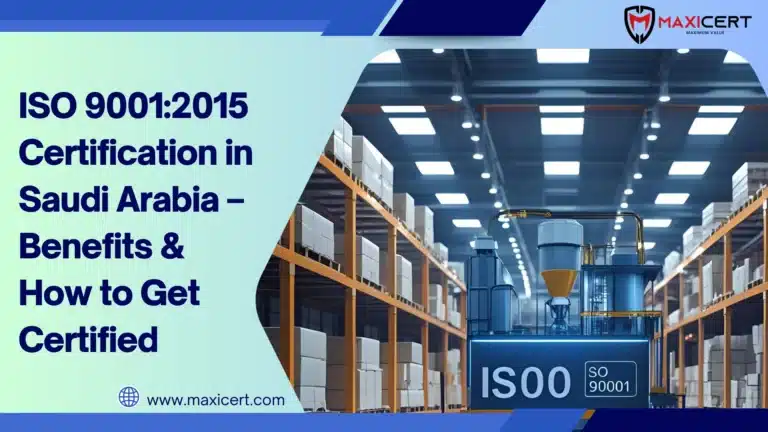ISO 9001:2015 Certification in Saudi Arabia – Benefits And How to Get Certified

Introduction
In Saudi Arabia’s fast-growing economy, customers expect more than just a good product — they expect consistent quality, reliable service, and trust. Whether you’re a manufacturer in Dammam, a healthcare provider in Riyadh, or a construction company in Jeddah, meeting these expectations is no longer optional.
That’s where ISO 9001:2015 certification is needed. It’s the most well-known quality standard on the planet for quality management systems (QMS), which can assist Saudi businesses in boosting efficiency, achieving global compliance, and securing more contracts.
This manual describes what ISO 9001:2015 is, why Saudi companies need to care, and just how to become certified.
What is ISO 9001:2015 and Why It Matters in Saudi Arabia
ISO 9001 forms the ISO 9000 family of standards, created by the International Organization for Standardization to enhance quality management across sectors. The 2015 version introduced significant improvements in the form of increased emphasis on risk-based thinking, leadership engagement, and process efficiency.
In Saudi Arabia, ISO 9001:2015 is perfectly in line with the nation’s Vision 2030 objectives, which focus on operational excellence, customer satisfaction, and global market competitiveness.
Segments where ISO 9001:2015 is highly beneficial in the Kingdom are:
- Oil & Gas
- Construction & Engineering
- Manufacturing
- Healthcare & Pharmaceuticals
- Logistics & Supply Chain
Request A Free Quote
Advantages of ISO 9001:2015 Certification for Saudi Businesses
Enhanced Quality of Products & Services
- Adopting ISO 9001:2015 assists companies in minimizing defects, providing consistent outcomes, and satisfying customers consistently.
Better Business Reputation
- Customers — particularly government and large businesses — are more confident in certified businesses. ISO 9001 is a common requirement in government tenders and large-scale contracts.
Operational Efficiency
- The standard promotes simplified processes, minimizes waste, and maximizes resource utilization — all of which save costs.
Market Expansion Opportunities
- ISO 9001:2015 paves the way to global trade and collaboration, as it is accepted by businesses and authorities globally.
Step-by-Step Guide to ISO 9001:2015 Certification in Saudi Arabia
Step 1 – Understand the Requirements
Learn about the ISO 9001:2015 standard and its seven quality management principles:
- Customer focus
- Leadership
- Engagement of people
- Process approach
- Improvement
- Evidence-based decision making
- Relationship management
Step 2 – Conduct a Gap Analysis
Compare your current processes with ISO 9001:2015 requirements. Determine where you are lacking and require improvement.
Step 3 – Develop & Document the QMS
Establish policies, procedures, and manuals outlining how your company ensures quality. Keep documents controlled and up to date.
Step 4 – Implement the QMS
Implement the documented procedures. Train employees, allocate responsibilities, and embed quality management in day-to-day activities.
Step 5 – Internal Audit & Management Review
Before you apply for certification, conduct an internal audit to verify compliance. Next, conduct a management review meeting to ensure top-level involvement.
Step 6 – Certification Audit
Choose an accredited Saudi Arabian certification body — such as the ones approved by the Saudi Standards, Metrology and Quality Organization (SASO) — and go through the formal audit. If successful, you will receive your ISO 9001:2015 certificate, which will last for three years.
ISO 9001:2015 in the Saudi Business Context
Saudi Arabia places great emphasis on quality and regulatory compliance. ISO 9001:2015 is used to facilitate:
- Compliance with SASO requirements
- Compliance with GCC trade and export regulations
- Increased customer confidence domestically and abroad
For instance, numerous oil and gas companies in the Eastern Province employ ISO 9001 to ensure rigorous working standards, while construction companies in Riyadh employ it to become eligible for government contracts.
Popular Issues with ISO 9001 Implementation And How to Mitigate Them
Employee Resistance – Involve employees from the start, explain the benefits, and give proper training.
Weak Management Support – Get leaders fully on board before starting the process.
Too Much Paperwork – Use digital tools to handle documents and make compliance simpler.
Lack of Understanding – Provide clear guidance so everyone knows what ISO 9001:2015 requires.
Time Constraints – Plan the process in stages to avoid overwhelming the team.
How Maxicert Can Assist You in Getting Certified
At Maxicert, we simplify ISO 9001:2015 certification for Saudi businesses to be easy, quick, and affordable. Our services cover:
- Gap analysis & readiness assessment
- QMS documentation & implementation
- Staff training & awareness programs
- Internal audits & audit readiness
- Assistance by certification and bi-annual surveillance audits
Discover our ISO certification services in Saudi Arabia to learn how we can assist your company towards compliance and expansion.
Conclusion
ISO 9001:2015 is more than a certificate—it’s a framework for lasting business success. Taking the first step now can position your company ahead of the competition.
Take the first step toward quality excellence. Contact Maxicert today for expert ISO 9001:2015 certification support in Saudi Arabia — and position your business for success in both local and global markets.

Get In Touch

Get In Touch

Get In Touch
Need A Free Estimate?
Get a free consultation and Checklist to get certified for ISO , HALAL, CE Mark Certification.
FAQ
How long does ISO 9001 certification take in Saudi Arabia?
Usually 3 to 6 months, depending on the size of your company and preparedness.
Is ISO 9001:2015 certification compulsory in Saudi Arabia?
No, but it is frequently necessary for government contracts, tenders, and export business.
How much does ISO 9001 certification cost in Saudi Arabia?
Depends on company size, industry, and certifying body.
Is it possible to get ISO 9001 certified for small businesses?
Yes. The standard is applicable to organizations of all sizes.
How often does ISO 9001 certification need to be renewed?
It lasts for three years, with an annual surveillance audit to ensure continued compliance.



